Woman Refuses To Give Rescued Cat To Facebook User Without Proof Of Ownership
Cats are the single most adorable creatures on the face of the earth. Maybe there are others too, but we only have eyes for these fluffballs. So do many others.
These felines are a top choice for pets, with about 25% of households in the U.S. having them—we understand why. It’s because these furry cuties offer great companionship and give free hugs and kisses.
Unfortunately, there are millions of cats out there with no homes and nobody to give free hugs and kisses. In some cases, they go missing from their homes, and their owners spend a long time trying to find them.
Some people get lucky and find their cats with help from friends, family members, or strangers. For others, the cat magically finds its way back home.
For this Redditor, a fluffy visitor magically found its way to her house...but it wasn't hers. Surprisingly, it kept coming back over and over again.
Thus, she decided to take it in, but not before trying to find out if it had gone missing and if its owners were looking for it.
In a Reddit post, the kind lady explained that although she had fallen in love with the cat, she was doing everything possible to find its rightful parents.
In her search, a woman on Facebook reached out, claiming ownership of the cat. The problem was that this supposed owner had absolutely no proof—no vet records, no recent adult pictures, nothing.
OP was wary of handing the cat to the wrong person, and so she decided not to release it to the woman. Well, this was where the war began.
Scroll down to read the whole story.
This Redditor is taking a hard stance against this supposed cat parent

OP and their grandmother came across a stray cat, and in an attempt to find the owner, they were contacted by a woman on Facebook
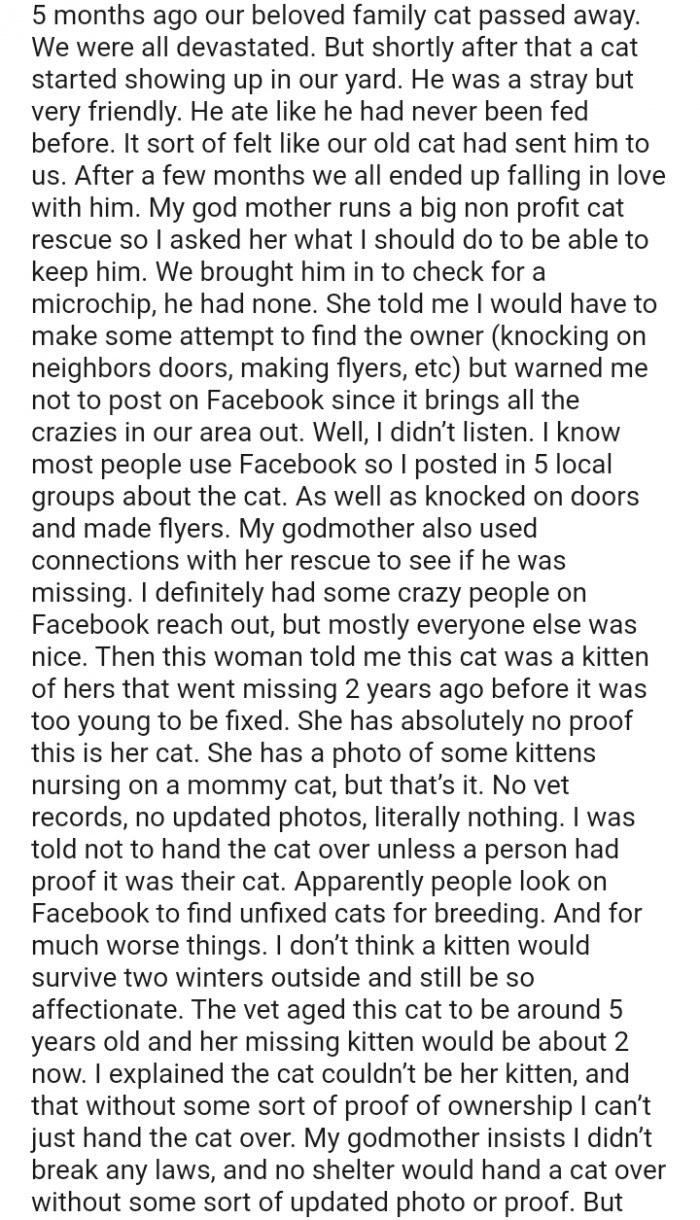
The woman couldn't prove that she owned the cat, and so OP refused to release it to her. However, she didn't take this decision lightly.

Exploring Ownership Dynamics
The dispute over the cat's ownership underscores the complexities of pet custody and attachment. Research from the Journal of Animal Ethics indicates that emotional bonds with pets can lead to significant conflicts regarding ownership, especially when proof of ownership is lacking.
Understanding these emotional attachments can help individuals navigate custody disputes more effectively.
Understanding Ownership and Responsibility
A pet ownership expert explains that the dynamics of pet ownership often involve legal and ethical considerations. In this case, the refusal to give up the rescued cat without proof of ownership reflects a deeper understanding of the responsibilities that come with pet care. Emphasizing the need for proof before transferring ownership can prevent potential neglect and ensure that pets are placed in suitable homes.
Research in animal welfare emphasizes that responsible pet ownership includes understanding the implications of adoption and ensuring that pets are cared for appropriately. This commitment to the animal's well-being is crucial for fostering a culture of responsible pet care.
Here's how the Reddit community reacted to the story:
"You should seriously consider filing a report with the police yourself for harassment"

"Tip for future reference... When you post a found animal online, don't post a photograph and in the description leave out some key items (sex, collar, tail length, identifying marks)."
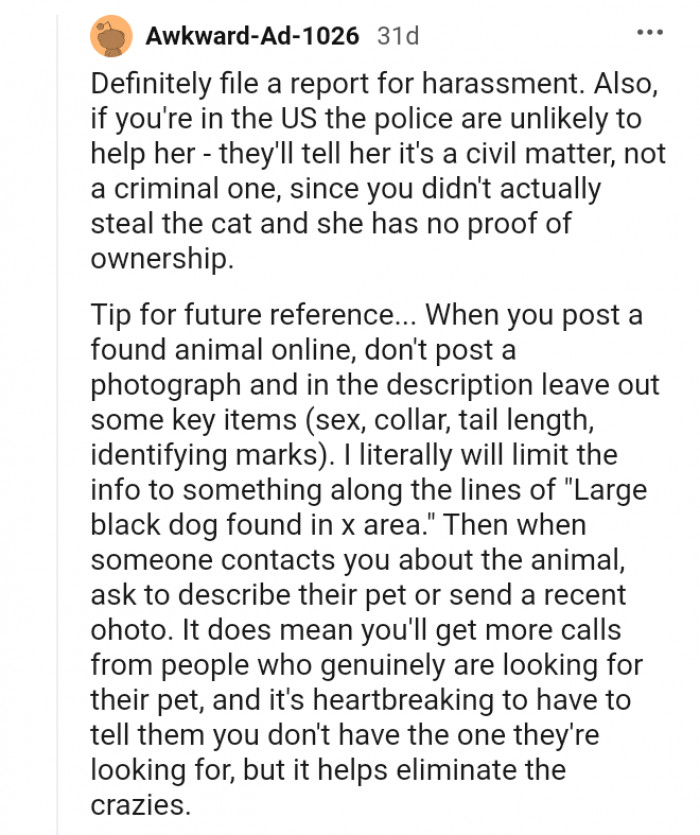
"Report her account immediately; doxxing a person is a crime"

Additionally, the role of documentation in ownership claims is crucial. A study conducted at Yale University found that clear, documented agreements can help prevent disputes over pet custody. This highlights the importance of having clear evidence of ownership, which can facilitate smoother resolutions when conflicts arise.
Recognizing this dynamic can help individuals prepare for potential disputes.
Furthermore, the emotional attachment to pets can complicate ownership disputes. A study published in the Journal of Applied Animal Welfare Science suggests that emotional bonds between pets and their owners can lead to heightened sensitivities during discussions about ownership. This emotional investment often leads individuals to feel protective over their pets, complicating negotiations.
Recognizing these emotional dynamics can help individuals approach ownership disputes with empathy and understanding. Open discussions about feelings can facilitate resolution while prioritizing the pet's best interests.
"Report her for harassment on FB"

"You need to document this woman's harassment and report everything to the police."
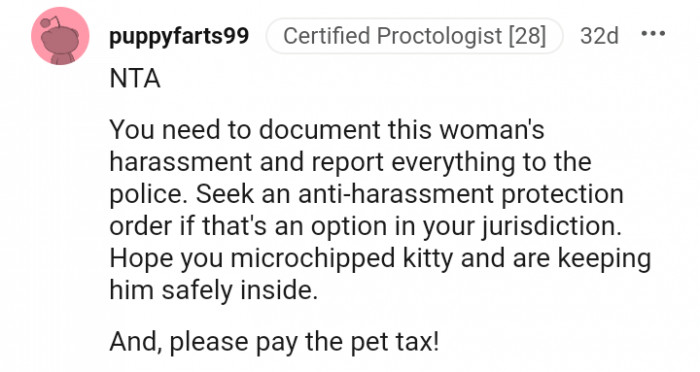
"She seems a bit crazy; don't give up the cat no matter what"
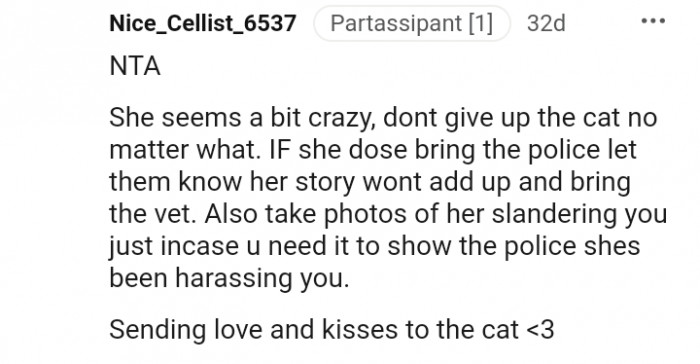
Effective Communication Strategies
To navigate disputes over pet ownership, effective communication is key. Experts recommend that individuals engage in open discussions about their feelings and the significance of the pet in their lives. For example, discussing the emotional ties to the cat may help both parties understand each other's perspectives more clearly.
This approach can foster empathy and lead to a more collaborative resolution.
The Importance of Documentation
In pet ownership disputes, documentation plays a crucial role in establishing ownership. Experts recommend that individuals keep records of adoption, veterinary care, and other relevant documentation to clarify ownership rights. This practice not only protects pet owners legally but also demonstrates a commitment to responsible pet care.
Research indicates that clear documentation can prevent misunderstandings and conflicts regarding pet ownership. Establishing a transparent process for transferring ownership can help streamline discussions and foster cooperation between parties.
"No. If she acts like that with you, imagine what she would do to the cat"

"Get the cat neutered ASAP, so people with the wrong intentions aren’t interested anymore"

"This person sounds a bit unhinged... you may want to consider contacting the authorities."
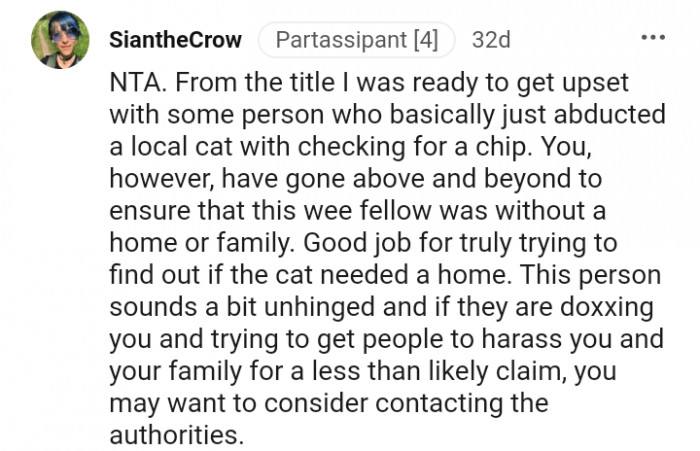
Moreover, creating a shared understanding of responsibilities associated with pet ownership can help prevent future conflicts. Research suggests that establishing clear agreements regarding care responsibilities can reduce misunderstandings. This can involve discussing how the pet will be cared for if shared custody is agreed upon, fostering transparency and mutual respect.
Engaging in these discussions can help create a more positive environment for both parties.
Moreover, communication strategies can significantly influence the resolution of ownership disputes. A communication expert suggests using 'I' statements to express concerns while avoiding accusatory language. For example, saying, 'I’m concerned about the cat’s well-being' rather than 'You are neglecting the cat' can facilitate a more constructive dialogue.
By focusing on shared goals—such as the cat's health—individuals can work together towards a resolution that prioritizes the animal's best interests.
"If she’s willing to doxx you over a cat, I can’t imagine what else she’s willing to do; be safe and take precautions"
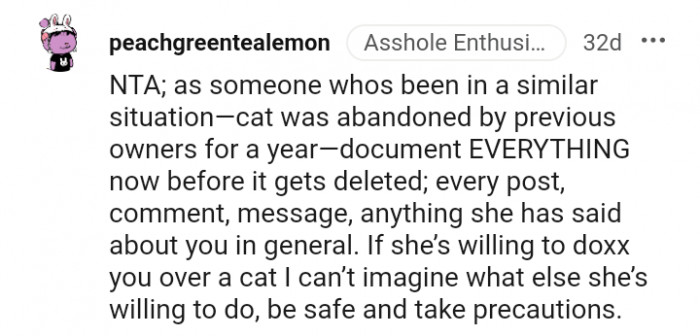
"Do not give him up—posting online was foolish, but giving up the cat is not a just penance for that."
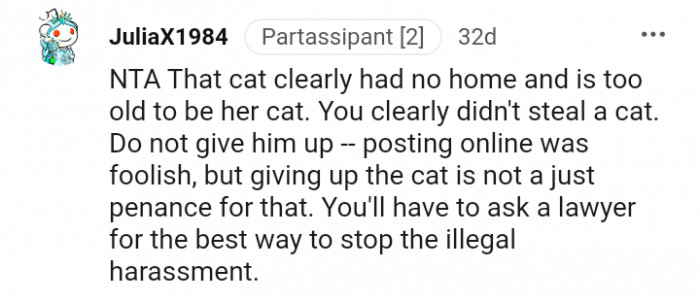
"Answer! Call her back out! Say the cat is not the age she says it is; say she has no pictures, no proof."
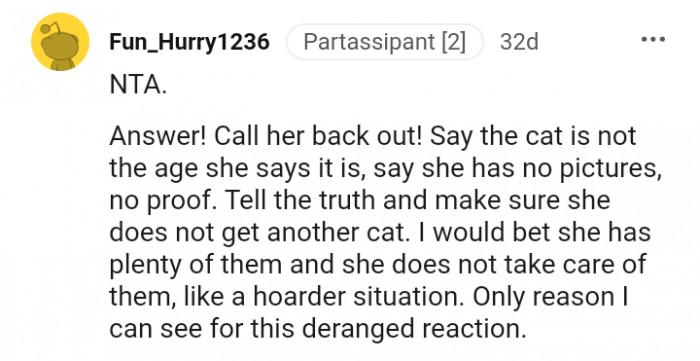
The Emotional Impact of Pet Custody Disputes
Pet custody disputes can have significant emotional repercussions. A clinical psychologist notes that individuals often experience feelings of loss and anxiety when faced with potential separation from a beloved pet. Understanding these emotional dynamics can help individuals approach discussions with greater sensitivity.
By addressing these feelings directly, parties involved can work towards healing and resolution.
Fostering Collaboration in Ownership Discussions
To navigate ownership disputes effectively, individuals should aim to foster collaboration rather than competition. Experts suggest that creating a shared vision for the pet's future can help both parties feel invested in the outcome. This might involve discussing the cat’s needs and how they can be met in the context of ownership.
Engaging in open dialogue about pet care responsibilities can also strengthen relationships and promote understanding. Utilizing mediation services can provide a neutral space for discussing ownership issues without escalating tensions.
"I have a scammer-of-a-cousin who managed to get her Pomeranian this way: faked and lied about being the owner of a lost dog who was found."
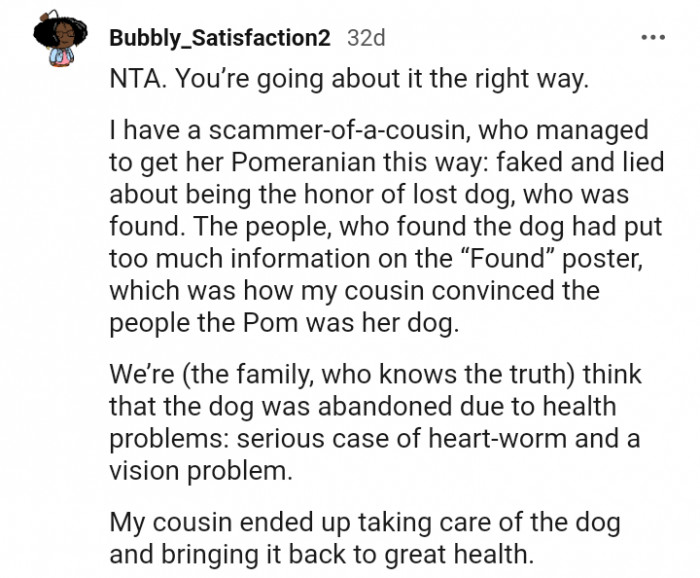
"I’d contact the police if I were you, though"

"You went through the proper channels, plus you did your due diligence with this cat. She’s another level of cat lady"
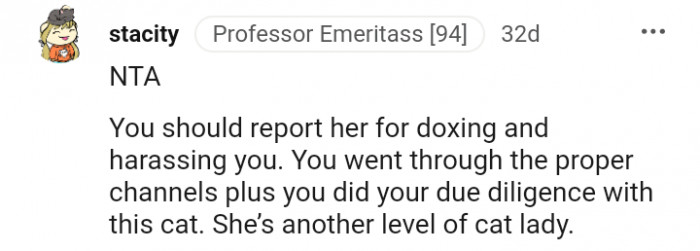
Ultimately, navigating disputes over pet ownership requires a combination of communication and emotional awareness. Studies show that individuals who address their emotional needs tend to reach resolutions more effectively. By prioritizing empathy and understanding, individuals can foster healthier interactions during custody disputes.
This situation underscores the importance of responsible pet ownership and the complexities of ownership disputes. By prioritizing open communication, documentation, and collaboration, individuals can navigate these discussions more effectively while ensuring the well-being of the animal.
"Report her to the police. Harassment online is still harassment and a punishable crime"

Every cat deserves a friend. However, not everyone deserves to own a cat.
That’s why it’s essential that people who claim ownership of cats after they go missing provide proof of ownership.
The people in the comments section seem to agree with this sentiment. With their ruling, we can determine that they think OP is NTA.
From the analysis we've gotten, the Facebook woman's cat should be around two years old, while the cat OP rescued is about five years old.
Do you think OP should have given the woman the cat despite her lack of proof? Let us know in the comments below!
Psychological Analysis
This situation highlights the complexities surrounding pet ownership and the need for clear communication. It's essential for individuals to approach ownership discussions empathetically and collaboratively to ensure the best outcomes for the animals involved.
Analysis generated by AI
Analysis & Alternative Approaches
In pet ownership discussions, understanding the responsibilities and emotional dynamics involved is crucial for resolution. Research indicates that fostering open communication and collaboration significantly enhances outcomes in ownership disputes. As Dr. John Gottman, a renowned marriage researcher, states, "The key to resolving conflicts lies in the ability to communicate effectively and empathically." Prioritizing these aspects can lead to more harmonious relationships between pet owners and prospective caregivers, as highlighted on his professional website Gottman.com.
Analysis & Alternative Approaches
In conclusion, disputes over pet ownership reflect deeper emotional attachments and the complexities of custody. Through effective communication and emotional understanding, individuals can navigate these conflicts successfully. Recognizing the emotional dynamics can lead to healthier resolutions and foster respect for all parties involved.



